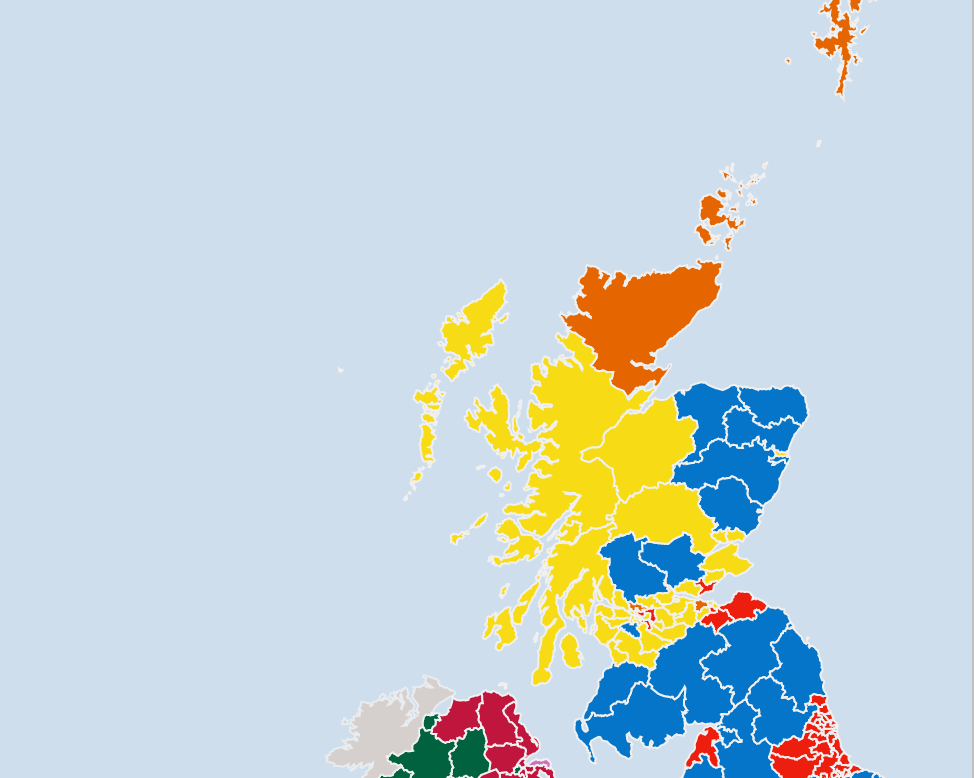For the UK Conservative party, Scotland will be seen as one of the few successes of an otherwise miserable 2017 general election campaign.
Despite the loss an overall parliamentary majority and Prime Minister Theresa May’s failed plan to transform her party’s huge poll lead to a domineering presence in Westminster, the Tories somersaulted their 2015 election win of a single Scottish seat, this time taking 13.
This is the biggest surge since the Tory’s Scottish collapse following the 1980s, and will leave many – in a country vastly proud of its anti-Tory stance – wondering what happened.
Three seats were won in the regions bordering England and in two traditionally conservative areas of central Scotland, a sign seen by some that there is little national appetite for a second independence referendum.
But another clue lies in Scotland’s wealthy, oil-rich North East, where the Conservatives won five seats from the Scottish National Party (SNP), the ruling party of the Scottish government and the third largest in Westminster.
The areas around Aberdeen are the shores harbouring Scotland’s oil wealth, housing over 40,000 jobs and generating billions of pounds of income for both the UK and Scottish economies. But oil production in the North Sea is in rapid decline – largely due to dwindling supply and the increased cost of extraction – with anxiety ensuing over what will happen to those that work in the sector and to the revenue which has been so valuable to the UK’s prosperity.
So what will the environmental and climate impacts of an increased Tory presence in the North East be, both for Scotland and the rest of the UK?
Low Carbon Momentum
Nick Molho, executive director of green business alliance the Aldersgate Group, believes that the low carbon transition now has sufficient momentum to be resilient to political hindrance – equally for its economic, business and political manifestations.
In 2015, figures from the Office for National Statistics showed that Scottish low carbon and renewable energy economy generated £10.5bn annually and employed 58,500 people.
Molho cited growing strength in areas such as tower manufacturing for wind turbines, low emission bus production, batteries, and innovation for marine renewables, including the European Marine Renewable Energy Centre in Scotland.
“The Scottish low carbon economy is becoming much stronger and I can’t see conservative Scottish MPs wanting to stand in the way of that,” Molho said.
In terms of a Conservative deviation from SNP policy in the North Sea, Molho pointed out that both parties fully support the continued exploration of new fields in the North Sea, and of the continued extraction of oil that is economically feasible. So, while not great for the climate, there may be no change here.
There are some subtle differences between the parties’ positions, however. SNP spokesperson for energy and climate change, Callum McCaig, accused the Conservatives of planning for a “managed decline of the industry” in his election campaign. The SNP, in contrast, would “help the industry thrive over the years ahead”, he said. McCaig lost his seat to Conservative Ross Thomson last night.
More positive for climate change, Molho suggested, is that in January the Scottish government set out a new climate change plan, including targets to reduce greenhouse gas emissions by 66 percent by 2032 from 1990 levels and to fully decarbonise the electricity sector by the same year. The plans have already been consulted on and received support from industry, including the oil and gas sector.
Climate and energy policy is an anomalous area of law making where specific sub-categories are split between the UK government and the devolved Scottish national government.
Whereas Westminster is responsible for renewables subsidies and the gas network, Hollyrood makes decisions on areas like energy efficiency and green innovation. In both governments, the policy agendas are highly centralised, despite much of the infrastructure concerned – be it oil or wind farms – being highly specific to local areas.
There are moments where these legislative competencies overlap. For example, as part of its draft climate plans the Scottish government is looking at the increased use of hydrogen in decarbonising heat in buildings, as a stride toward increased energy efficiency. To do this, however, requires permission from the UK government to inject hydrogen in the national gas networks. Here the complexity of devolution is clear, as interplay will unfurl between SNP members of the Scottish parliament, those sitting in Westminster and their Conservative colleagues.
Climate Determinism
There is a burgeoning sense of determinism within the climate change movement which says that a low carbon transition is so necessary, so rational for the security of the future, that political expediency can no longer get in the way. A similar message reverberated following the US president Donald Trump’s withdrawal from the Paris Climate Agreement – that fossil fuel nationalism will not stop the global resistance to manmade climate change.
Molho says that the positive climate commitments that all the major parties made in their manifestos, the Conservatives included, give hope to the support of existing climate policies and of future progress. “Climate is increasingly standing above politics,” he said.
But what environmentalists argue is the inevitability of a low carbon transition, and regardless of its support from business and industry, a particular marker of our current epoch is the frequent lack of alignment between a politician’s public policy and their public rhetoric.
In terms of climate change, at least, it may be that incoming Scottish Conservative MPs understand well the pressing needs and the investment opportunities that come with it. But whether their constituents living on the coasts of the drying North Sea support this too is another matter.
Photo: Screenshot of BBC election results
Subscribe to our newsletter
Stay up to date with DeSmog news and alerts






